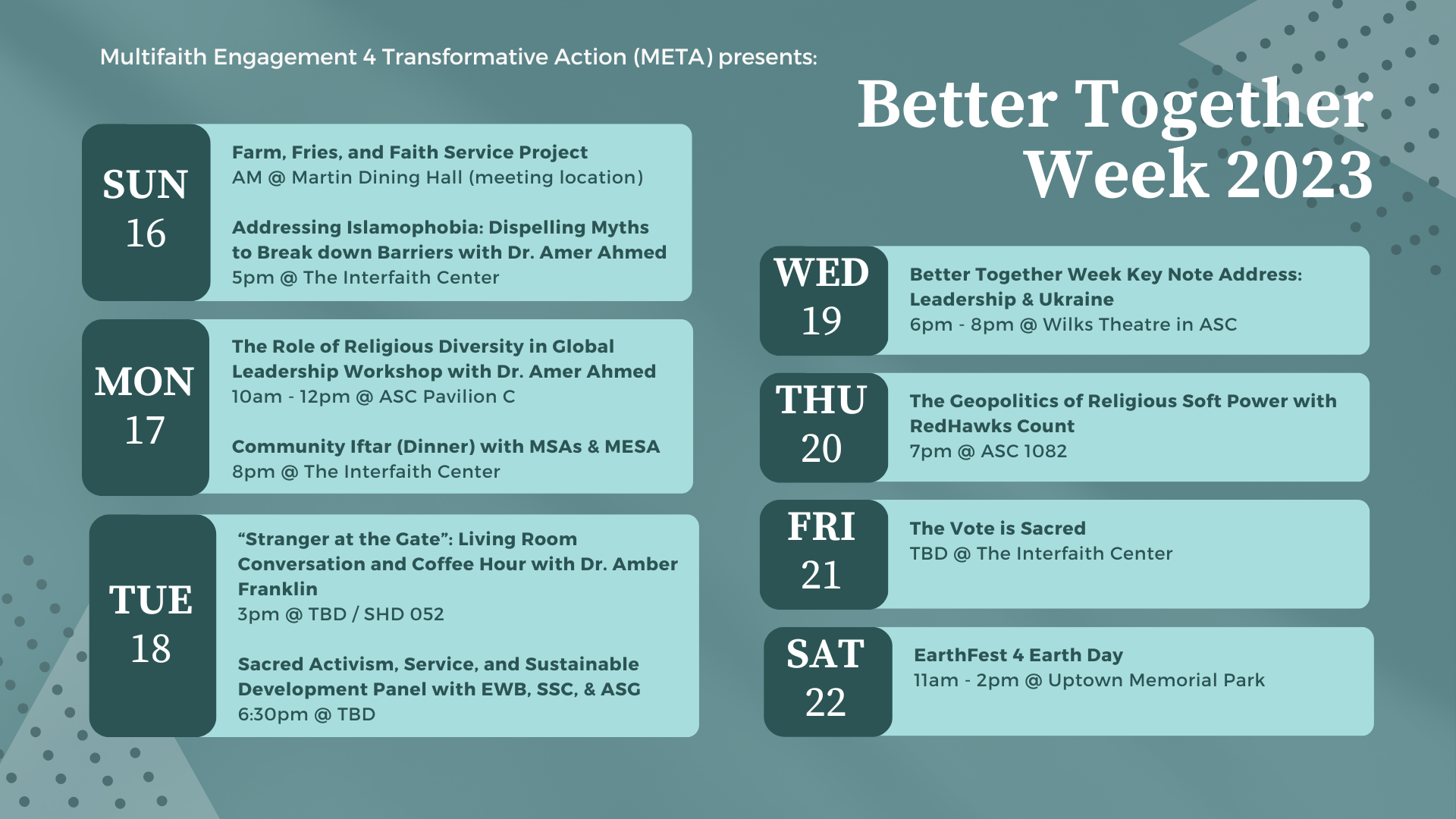OIDI April Newsletter

The Miami Pulse
Connecting, Assessing, and Moving Forward our Inclusive Community
April 2023 Edition

Land Acknowledgement
Miami University is located within the traditional homelands of the Myaamia and Shawnee people, who along with other indigenous groups ceded these lands to the United States in the first Treaty of Greenville in 1795. The Miami people, whose name our university carries, were forcibly removed from these homelands in 1846.
In 1972, a relationship between Miami University and the Miami Tribe of Oklahoma began and evolved into a reciprocal partnership, including the creation of the Myaamia Center at Miami University in 2001. The work of the Myaamia Center serves the Miami Tribe community and is dedicated to the revitalization of Miami language and culture and to restoring that knowledge to the Myaamia people.
Miami University and the Miami Tribe are proud of this work and of the more than 140 Myaamia students who have attended Miami since 1991 through the Myaamia Heritage Award Program.
Letter from the Vice President for Institutional Diversity and Inclusion
Greetings Miamians!
Welcome to the third edition of the Office for Institutional Diversity and Inclusion’s (OIDI) quarterly newsletter. As always, we are grateful for the significant efforts students, faculty, and staff continue to engage in to ensure the Miami community is one in which all feel welcome and included.
On March 31, at the annual Across the Divide: Innovating Inclusive Excellence conference, the Miami community came together to engage in dialogue and learning surrounding inclusive classrooms, neurodiversity, inclusive communications, and intercultural consciousness, among other topics, through a full day of panels, workshops, roundtables and posters- stay tuned for pictures and more details from the conference in our next edition. We began our discussions the previous day, through César Chavez Day events. The powerful conference keynote by Dr. Ron Crutcher, “I Had No Idea You Were Black: Navigating Race on the Road to Leadership,” reminded us of the many micro and macro ways in which being inclusive is central to the excellence and success of all students, faculty, and staff at Miami.
This edition features Dr. Sara Acevedo, Assistant Professor in the College of Education, Health, and Society. She shares information on her career trajectory and research as it informs the interdisciplinary field of disability studies, her focus on neurodiversity scholarship, and two different honors she recently received connected to her work in critical disability studies and neurodivergent culture. Lisa Miller, Senior Associate Athletic Director for Internal Operations, shares her approach to student-athlete success at Miami, and the role ensuring an inclusive and diverse environment plays in those efforts. Janna Maddox, Human Capital Management and Leadership and Entrepreneurship co-major and President of the Asian American Association (AAA), discusses her role and the role of AAA in building community and promoting belonging at Miami.
Earlier this semester, the Office for Institutional Diversity and Inclusion, in collaboration with Miami Online, Professional Education, launched Miami’s internal offering of our award-winning online DEI in Leadership course. The course, facilitated by Miami faculty and staff content experts, is now available and free to Miami faculty, staff, and graduate students through Miami’s online course catalog, and can be accessed with Miami credentials. Miami participants can select from available modules, or complete all modules and receive an Accredible Badge after completing the course. This semester we also launched NameCoach, a tool that provides pronunciation information for student, faculty, and staff names, and which is available to Miami users in Canvas and online. You may have seen it on email signatures and Canvas this semester. Read our Spotlight in this newsletter to find out more about this resource. These are just two ways we are putting into practice our commitment to ensuring a learning, working, and living environment where students, staff, and faculty from all backgrounds can thrive.
As always, we welcome your feedback and suggestions and invite you to reach out to OIDI staff. Thank you for all you do to reflect and advance Miami’s commitment to an inclusive community, now and moving forward.
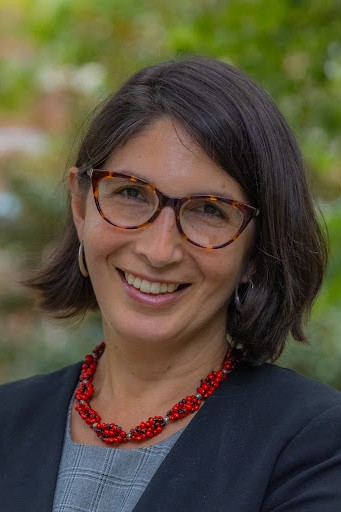
Love and Honor,
M. Cristina Alcalde, Ph.D. (she/her/hers)
Vice President for Institutional Diversity and Inclusion
Professor, Global and Intercultural Studies
vpDiversity@MiamiOH.edu
Heritage Month Updates
Working in close collaboration with faculty, staff, and student partners, the Office of Institutional Diversity and Inclusion provides opportunities for the Miami community to continue our learning and engage in meaningful programming that recognizes, examines, and values historical legacies of a diverse array of identities. Heritage Month programming supports Miami’s inclusive excellence and DEI mission and connects to, among other areas, DEI Task Force Recommendation, Pillar 2: Cultural Consciousness, which encourages the Miami University community to enhance our awareness, knowledge, and skills to enrich and renew our intercultural competence.
The Office of Institutional Diversity and Inclusion will organize programming, and collaborate, coordinate, and support events across campuses through a coordinated calendar for each month; promotion of events; and, when available, limited funding support for proposed events with appeal across campuses.
MU Libraries is partnering with OIDI to feature online resources, including films, books and articles, and class offerings, during each Heritage Month. We invite you to explore these and other educational resources and links on each webpage. We will be adding resources as they become available.
To learn more about this quarter’s heritage months please visit our Heritage Month webpage:
- April:
- Arab American Heritage Month
- César Chavez Day
- May:
- Jewish American History Month (Holocaust/Genocide Awareness Week)
- Asian Pacific Island Desi American Heritage Month
History Month Events Submissions
Now Accepting Submissions for History Month events and programming for Spring semester. Working in close collaboration with faculty, staff, and student partners, the Office of Institutional Diversity and Inclusion provides opportunities for the Miami community to continue our learning and engage in meaningful programming that recognizes, examines, and values historical legacies of a diverse array of identities. Heritage Month programming supports Miami’s inclusive excellence and DEI mission and connects to, among other areas, DEI Task Force Pillar 2: Cultural Consciousness, which encourages the Miami University community to enhance our awareness, knowledge, and skills to enrich and renew our intercultural competence. Submit your proposal considering priority deadlines for each proposed history and heritage month celebrations.
Affinity Group Updates
Asian/Asian American Faculty Staff Association
President: April Robles, Director of Operations and Communications
The mission of the Asian/Asian American Faculty Staff Association is to bring together Asian and Asian American faculty and staff, and serve as a supportive community for Asian and Asian American employees and students. The Asian/Asian American Faculty Staff Association is currently building traction with the community and is seeking to provide opportunities for individuals to connect in a more casual atmosphere and then use that leverage to continue the growth and momentum of the group. If you are looking to make an impact and be a leader, this is the group for faculty and staff to join! If it is a personal passion and something they want to do to become more connected to the campus community, you are encouraged to reach out to April Robles to connect.
Association of Black Faculty and Staff
President: Seth Seward, Assistant Director, Alumni Relations
The Association of Black Faculty and Staff stands for diversity, equality, solidarity, and change for campus at large, students, and the Oxford community. As an organization, they will engage and participate in any efforts that are meant to educate and provide clarity of ideas of ending racism and discrimination. The Association of Black Faculty and Staff serves as a safe place for African American or black individuals to come together and meet. This is accomplished through general body meetings and social events. If something arises on campus that impacts the community, they gather together to discuss and hash out solutions in a safe space. The group also works to serve as a support system and network for students, staff, and faculty. While there are no current community events planned, anyone interested in becoming a member is encouraged to complete the membership formstack to connect.
Association of Latinx Faculty and Staff
President: José Amador, Associate Professor, Global and Intercultural Studies (Latin American, Latino/a, and Caribbean Studies)
The primary goal of the Association of Latinx Faculty and Staff primary is to support and raise awareness about the Latinx faculty and staff. They aim to build networks between departments and units, faculty and students, and Miami university and the community at large. The group also strives to raise the visibility of the Latin American Studies Program and the nearby Latinx community. Additionally, to keep everyone informed about everything Latinx-related, which is done through a weekly “bulletin” with news and events. This organization has been formed by employees of Miami University (Hamilton, Middletown, and Oxford campuses) to foster Latinx, Latin American and Caribbean, and Ibero, Luso-American representation, improve work conditions, and enrich the social and cultural environment for all Miami faculty, staff, and students. Individuals interested in connecting can reach out to José Amador.
Classified Personnel Advisory Committee
President: Angela Coffey Brown, Administrative Assistant, Enrollment Management and Student Success
The Classified Personnel Advisory Committee is established for the purpose of advising the President, Vice Presidents, and Human Resources on matters of interest and concern to classified staff members in the context of the whole university community. The group accomplishes this by bringing issues/concerns/proposals to administration for input and/or action, serving (individual members) on university committees, and providing feedback/input on matters brought to the committee for review. Additionally, the Classified Personnel Advisory Committee is established to provide an institutional venue or forum in which matters of interest or concern to classified staff members can be discussed, considered, and/or moved forward through appropriate channels. Anyone interested in connecting with or joining the committee can contact Angela Coffey Brown or reach out to the CPAC email.
International Faculty and Staff Association
President: Jacqueline Rioja Velarde, Associate Director of the Global Initiatives' CAWC
The goal of the International Faculty and Staff Association at Miami is to support and connect international faculty and staff while helping each other thrive in their specific roles on campus. This is accomplished through connecting with colleagues from diverse cultural, ethnic, racial, linguistic, and educational backgrounds, and broadening perspectives, welcoming diversity, and experiencing inclusion at Miami. The group also seeks to listen, understand, and identify the needs of international faculty/staff, address the concerns and needs of the university, provide relevant resources as needed, and help international faculty/staff. The main goal of the group is to support one another in professional development at the university.
IFSAM recently had a change in leadership. The new president for the group is Jacqueline Rioja Velarde. Jacque is the Associate Director of the Global Initiatives’ CAWC. She joined Miami University in 2003 as faculty in Geography and the Latin American Studies Program, and the CAWC in 2006. She initiated her career in higher education at the Pontifical Catholic University of Peru -PUCP. She earned her B.A. in Humanities & B.Ed. in Social Sciences from the PUCP; and her M.A. in Geography from Syracuse University. Practitioner of Global education co-curriculum development with a focus on DEI & social justice pedagogy; intercultural communications; and ICQ Global DISC™.
The group also has a newly appointed communications chair, Ebru Dirsel-Duffield. Ebru has been teaching in the ACE (American Culture and English) Program since 2013. She earned her doctoral degree in TESL (Teaching English as a Second Language) at the University of Cincinnati. Her research interests include ESL teacher education, non-native English speakers, second language acquisition, and cross-cultural adaptation.
Interested individuals can reach out to IFSAM’s president Jacqueline Rioja Velarde, communications chair Ebru Dirsel-Duffield, or to the IFSA email.
Queer and Trans Faculty and Staff Association
President: Emily Cluen, Resident Director, Office of Resident Life
The goal of the Queer and Trans Faculty and Staff Association is to create space for the LGBTQIA community on campus and advocate for queer and trans individuals needs. The group is currently working on establishing and maintaining a larger group to allow for more capacity moving forward. For more details or to join our listserv, email QTFSA@MiamiOH.edu. The group is looking to host more events moving forward to connect with more folks on campus and provide more networking opportunities. Interested individuals can email the group’s email address to connect.
Unclassified Personnel Advisory Committee
President: Sarah Persinger, Associate Director DBS Technology Operations & Support
The Unclassified Personnel Advisory Committee was created in 1983 to advise the University Administration (specifically the president and vice presidents) on matters of interest and concern to unclassified personnel. Committee members are selected to reflect a balance of gender, race/ethnicity, campus, division, level in the organization, responsibilities, years of university service, and any other characteristics that help to achieve a balance of knowledge, experience, viewpoints, interests and talents. The group’s most recent endeavor was focussing on wellness and bringing back access and funding to wellness areas on campus. Individuals interested in joining are encouraged to attend the monthly virtual meetings, which take place on the second Tuesday of each month. Interested individuals can also connect with Sarah Persinger for more information.
To learn more about affinity groups or to join a group, check out the main affinity groups web page for more information.
Diversity, Equity, and Inclusion Campus Spotlight
Miami Spotlight
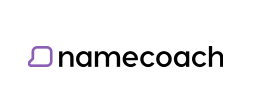
NameCoach
Pronunciation Tool
NameCoach, a tool that helps provide pronunciation information for student, faculty, and staff names, is now available for Miami users in Canvas and online!
As colleagues, educators, friends, and learners, interpersonal communication is key for everyone at Miami. Respect and inclusion are key to ensuring an inclusive and welcoming environment, and that includes correctly pronouncing our fellow Miamians’ names. Having the tools to correctly pronounce each of our names helps promote an inclusive environment for folks of all socio-cultural identities, and NameCoach is going to help us do that.
Users of NameCoach across campus have had great experiences with the tool to date, and enjoy the ability to have and share information. Alicia Castillo Shrestha, Program Coordinator for Global Initiatives, has been utilizing NameCoach even before it came to Miami at large. Castillo Shrestha has been utilizing NameCoach since she started at Miami. She noted that she found the tool to be helpful, and that her favorite thing about NameCoach is “that it allows you to use your own voice to record your name and creates a simple way to include it in your email signature so it’s accessible to all your contacts. Castillo Shrestha went on to share that she would recommend the tool to others, “as it’s a resource that reinforces the importance of names when engaging with others.”
Another member of the Miami community who has found the value of NameCoach is April Robles, Director of Operations and Communications for the Center for Career Exploration and Success. Robles explained that she found the tool to be helpful, noting, “I think it is a great way to help others take pride in their name and be more confident in approaching others without faltering on how to pronounce their name. It shows care and respect.” Robles’ favorite thing about NameCoach is the ease of access it provides and the integration with Canvas and the Miami email signature. Robles would recommend the tool to others, sharing that, “I plan on working with our Career Center team so that we can also include NameCoach on our ‘About Staff’ page.”
Utilizing NameCoach is a great way to be a part of building a more inclusive Miami. By ensuring a key part of our identities are shared and pronounced correctly, NameCoach provides a way for faculty, students, and staff to have an easy way to be more inclusive and better represented across campus.
With NameCoach, anyone at Miami can record a pronunciation for their name and share it with the community. NameCoach has been integrated directly with Canvas so that instructors can see the pronunciations of students’ names.
There are two ways to record your name with NameCoach:
- Record your name in Canvas
- Record your name directly in NameCoach for your email signature, social media accounts, or professional biography
Please note: To have a pronunciation show up in Canvas, you have to record in Canvas. The direct NameCoach recording will not cross-pollinate.
Visit MiamiOH.edu/NameCoach to record your name in NameCoach today!
Interviews conducted by: Abbie Proeschel (she/her), Communications and Events Coordinator, Office of Institutional Diversity and Inclusion
Faculty Spotlight

Sara M. Acevedo, Ph.D.
Assistant Professor, Disability Studies, Department of Educational Psychology
College of Education, Health, and Society
Over twelve years ago while studying historical linguistics and French in Spain, Sara M. Acevedo, Ph.D., had the opportunity to come to the United States to work with disabled adults. During her time here, she got to learn about disability history. Professor Acevedo then decided she wanted to learn more about the disability experience, leading to her first encounter with disability studies as a field.
She enrolled in the disability studies program at Temple University in 2009, which was at the time the home of a well-recognized disability studies scholar. This graduate program was a life-transforming experience for Professor Acevedo and is part of what influenced her desire to continue on in disability studies as a scholar. Once she made the jump, she never looked back and has been conducting research and teaching in the field since.
In addition to her professional and academic life leading her to disability studies, her personal experiences also contributed to her current research area. Throughout her life, Professor Acevedo noted she “always knew that I was different and thought differently.” As she began her journey in disability studies, aspects of her personal life slowly began to click into perspective. Many years passed before she pursued her Ph.D. in Anthropology and Social Change at the California Institute of Integral Studies in San Francisco. Professor Acevedo noted that she “wanted to explore this particular program for my Ph.D. because disability studies is a growing interdisciplinary field and this program, unlike any other, offered the opportunity to think and expand my work on disability justice.”
Professor Acevedo’s time in her Ph.D. program allowed her to engage with a more “politicized approach to disability studies” compared to a more rights-based, inclusionist perspective. In 2012, Dr. Acevedo began to take interest in and study neurodiversity. During her dissertation, she began working with a group of autistic adults who were coordinating and providing services in a transition program to other autistic and otherwise neurodivergent youth. “This was a very unprecedented program, as disabled people occupied a vital leadership position transforming traditional systems of service provision of which they have only been the recipients. It was through her work with this program that Professor Acevedo came to understand an integral part of her identity and eventually led to her pursuing a formal diagnosis of autism to ensure she had access to resources and accommodations if she needed them.
Dr. Acevedo went on to explain “in terms of a formal diagnosis, it serves as a public transcript that allows you to speak the language of the system. This diagnosis will get you through things like the healthcare system, but having a formal diagnosis or a public transcript is not needed to know who you are and your community.” Professor Acevedo explained the cultural aspect of autistic diagnosis by using the concepts of hidden and public transcript as James Scott (1990), cultural anthropologist, coined them. In broad strokes, a hidden transcript is an active form of resistance kept secret from those in power, whereas a public transcript is a form of fake compliance performed for those in power (Scott, 1990). These differences are key in understanding how disability is presented to the world around us compared to the unseen aspects of community experiences.
Dr. Acevedo’s personal and academic experiences led her to neurodiversity scholarship, which is currently where an important portion of her work resides. Specifically, Professor Acevedo examines critical disability and autism studies, along with neurodivergent self-direction and neurodiversity culture. According to Acevedo, “critical disability studies examines the intersections between disability and other forms of oppression and liberation.” Importantly, Dr. Acevedo engages directly with Disability Justice activism, which is “a grassroots movement pioneered and led by Black, Indigenous, and People of Color (BIPOC) nurturing networks of care and community building, rather than policy reform and governing. Disability Justice reaches out to all intersections and focuses on the experiences of trans, queer, poor, incarcerated and other BIPOC.” This lens moves into perspectives of disability experience without universalizing ideas of identity.
Recently, Dr. Acevedo was awarded two different honors relating to her work in critical disability studies and neurodivergent culture. The first of these awards was a grant through the Ford Foundation, U.S. Disability Rights Program, relating specifically to Dr. Acevedo’s work on neurodiversity activism. This program was designed “to support disabled people in building power to achieve greater economic justice and realize their rights as a result of sustained and coordinated advocacy driven by diverse disability rights and justice leaders.” Acevedo’s award will be utilized to further her research and ultimately develop a cultural center or hub where the neurodivergent community can come together to develop and design their own activist agenda. “That’s the long-term vision. To end up with a sustainable cultural center, a virtual and a physical space, that will remain beyond my time and to create a lasting community network focused on self-directed activism.”
The second award recently granted to Dr. Acevedo was her induction into the Susan M. Daniels Disability Mentoring Hall of Fame, which was “established to honor those who are making significant difference in the lives of youth and adults with disabilities through mentoring and to raise awareness about the importance of mentoring individuals with disabilities.” When asked what it was like to receive such an honor, Acevedo stated she “was surprised and very honored. I am very humbled by this honor and to be joined by so many other wonderful people in the history of disability activism who have received the honor. Among them, the trailblazer Judy Heumann, who very recently passed away after decades of fearless disability rights activism. Judy dedicated her life to fighting for justice, touching the lives of many. Her legacy will live on for generations of activists to come.” This award was given as a reflection of the mentoring work that Acevedo conducts in addition to her research, teaching, and service.
This coming fall, Dr. Acevedo will be traveling to the University of Buffalo as a part of her appointment to their Distinguished Visiting Scholars program. “The program provides scholars and artists of exceptional accomplishment a unique opportunity to join a cohort of visiting faculty to promote diversity, equity and inclusion.” She is excited to share her work around critical disability and autism studies, focusing on the disability experience at the intersection of other negatively marked identities with the University at Buffalo and extended community. During this time, Acevedo will be mentoring graduate and undergraduate students, developing curricular and cultural programming, and working on her research among other things. She is looking forward to the opportunities for growth this experience will provide and beginning her work in collaboration with other scholars, faculty, students, and staff this coming Fall.
Interview Conducted by: Abbie Proeschel (she/her), Communications and Events Coordinator, Office of Institutional Diversity and Inclusion
Scott, J.C. (1990). Domination and the Arts of Resistance: Hidden Transcripts. Yale University Press
Staff Spotlight
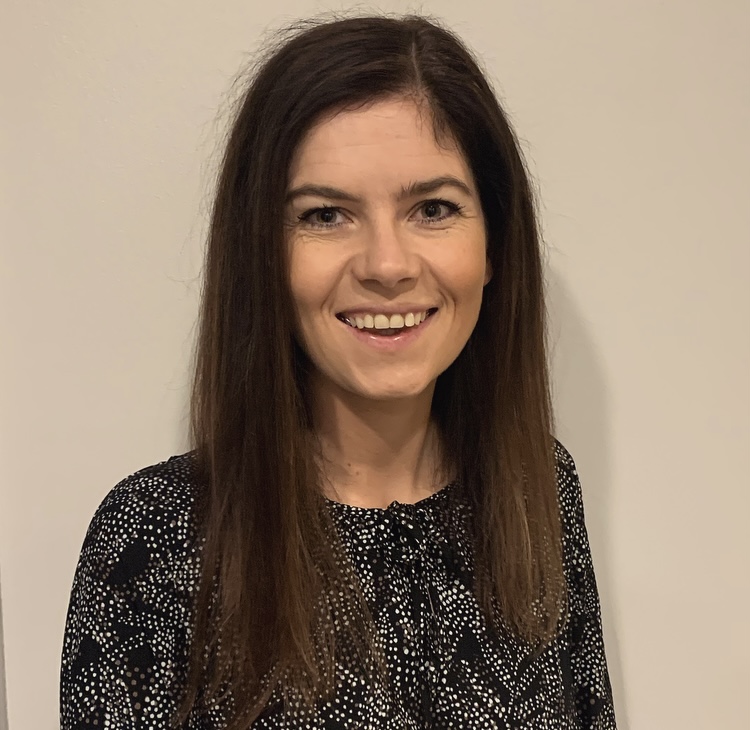
Lisa Miller
Senior Associate Athletic Director for Internal Operations
Miami University’s Athletics Department maintains a wide reach, with a total of 16 men’s and women’s sports teams. Miami Athletics works diligently to ensure that diversity, equity, and inclusion (DEI) reaches into all areas of athletics. With DEI goals and an action plan, the athletics department strives to create and maintain an open dialogue with students, faculty, and staff, while maintaining a variety of educational resources for educational opportunities.
Lisa Miller, Senior Associate Athletics Director for Internal Operations, recently discussed her position with a member of our staff. When asked how she approaches DEI in her daily work, Miller noted that anything regarding student athletics that does not involve a coach is in her purview. This includes, but is not limited to, a variety of cross-campus collaborations to support DEI programming for student athletes.
Miller noted that a variety of programming has been made available to student athletes. “Annually, we aim to ensure all our student-athletes are actively engaged in a dynamic DEI educational experience. This January, we brought Dr. Derek Greenfield to campus, a nationally recognized inclusive excellence facilitator. Our student-athletes engaged in a 2.5 hour interactive educational program aimed at examining personal biases and working together to achieve inclusive excellence.” Programs like these, and other similar experiences, have created an environment for students to feel supported and engaged, while learning more about DEI and broadening their educational perspectives.
In addition to programming and workshops, Miller explained that her team has also supported discussions such as the RealTalk Panel Discussion to further inclusive excellence on campus. “We recently hosted a RealTalk Panel Discussion for our student-athletes. A diverse group of coaches and administrators answered a series of questions posed by student-athletes related to personal lived experiences, navigating challenging situations and advancing Miami Athletics inclusive culture.” These discussions have provided the basis for deeper conversation and understanding with Miami Athletics and have been highly attended by student athletes.
Miller’s role as Senior Associate Athletics Director for Internal Operations in Miami Athletics also includes serving as the NCAA Diversity and Inclusion Designee (ADID) for Miami University. As ADID, Miller is responsible for serving as the primary point of contact for diversity and inclusion in the athletic department. Miller went on to explain “I’m fortunate to report directly to the Director of Athletics, David Sayler, and we work closely together to ensure inclusion efforts are a priority for our department. In this role, I also have access to many important resources at the national level, conference level, and institutional level to ensure our inclusion efforts continue to advance. I currently serve on the Mid-American Conference Diversity and Inclusion Committee, Miami University Divisional Diversity Officers Committee, and participate in NCAA Inclusion Programming annually.” This role is important for Miami Athletics and the institution at large as Miller works to continually ensure that DEI efforts are advancing and creating a more inclusive Miami within the athletic community.
Some strategies that Miller utilizes to accomplish this goal include working with students to have them directly involved in DEI work, along with weekly staff updates within the department. By having regular updates, there is transparency about DEI efforts that are being conducted. Additionally, Miller seeks out campus partnerships to further DEI work within athletics. “Our campus partnerships are incredibly important to intercollegiate athletics and ensuring we work together to create an inclusive campus. We so appreciate their insight, expertise, and creativity in working with our department. We’ve been so fortunate to collaborate with the Office of Institutional Diversity & Inclusion, the Center for Student Diversity & Inclusion, and the Myaamia Center.” These collaborations make spaces for student athletes to build community, further their DEI education, and create awareness across campus in an effort to build a more inclusive community.
When asked how DEI in athletics had changed in her time at Miami, Miller noted that DEI has become more of a priority in recent years both at Miami and across the NCAA, with staff being more engaged not because they have to be, but rather because of a desire to be engaged and informed. Miller went on to explain that “Miami Athletics aims to reflect, uphold, and champion the values of the Miami University campus community. Inclusive Excellence is a priority for Miami University and it’s a priority for Miami Athletics. As Inclusive Excellence has become a more prominent framework, our coaches, staff and student-athletes are even more active now in seeking out resources, programming, and experiences to listen, learn, and grow.”
As DEI efforts continue to progress at Miami and in the athletics department, Miller notes that DEI will continue to remain a priority in her role and for her team. “Our student-athletes are diverse, passionate, dynamic and extraordinary champions of inclusive excellence. Our hope is to continue to build on our already meaningful collaborations with our cross campus partners. Our student-athletes are ready and willing to participate. I’m also hopeful that more of our staff, coaches and student-athletes will take on leadership roles in this space and serve on various campus and conference committees as opportunities open.”
To learn more about the DEI efforts taking place in the Miami Athletics department, please visit their website.
Interview Conducted by: Braelyn Bean (she/her), Master in Sport Leadership and Management with a Certificate in Sport Psychology, Class of 2024
Student Spotlight
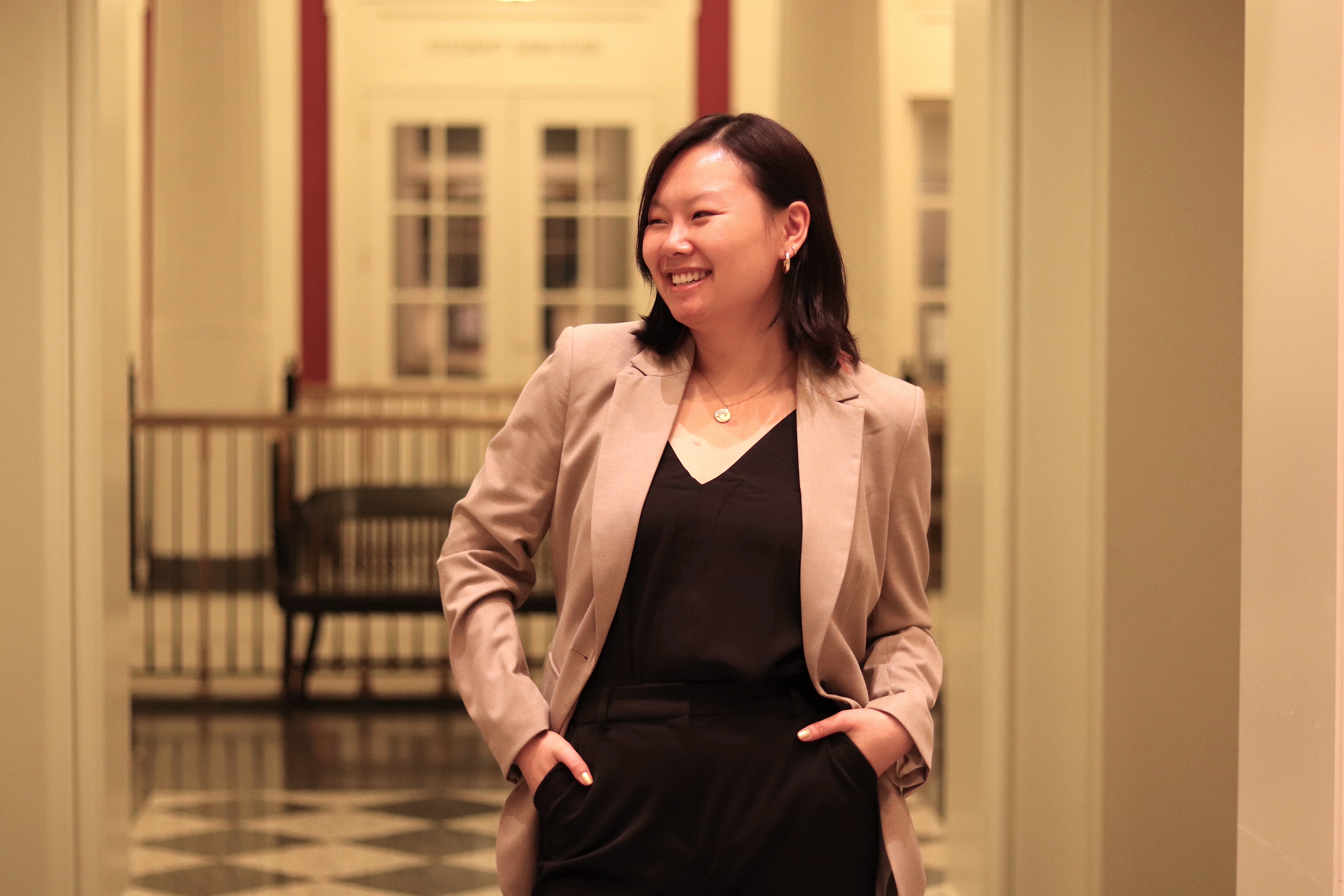
Janna Maddox
President, Asian American Association
Human Capital Management and Leadership; Entrepreneurship, Class of 2023
Miami’s student organizations provide a rich and comprehensive network for students to connect and engage with their peers across campus. These student organizations work diligently to create events and initiatives that service the student body and further educational opportunities and social connections across campus.
Janna Maddox, a Human Capital Management and Leadership major with a co-major in Entrepreneurship, recently met with a member of our staff to discuss her role in Asian American Association (AAA) along with their upcoming events and initiatives.
Maddox currently serves as the president for AAA. She described her role as multifaceted, noting that as president, she served to conduct outreach with other organizations and offices across campus to make sure that her organization was well-connected to the Miami community. While Maddox has her team to support her in the planning and execution of events conducted by the organization, her responsibility still includes overseeing logistics and ensuring that things are running smoothly.
Another aspect of Maddox’s role as president includes functioning as a voice for the AAA organization across campus. “Given that we are the largest Asian American, Asian Pacific Islander (AAPI) organization here at Miami, in a sense for a lot of different articles and interviews, I’m…a voice for all of those other organizations as well. That’s probably the biggest aspect of the role that is also a little terrifying, because I am one of out of hundreds of AAPI students and other students who are engaged with AAPI culture on campus.” Maddox went on to note that in her role as president, she works to ensure that she can encapsulate the varied perspectives of the students she represents to present their voices to the larger Miami community and maintain solid communications with other offices and organizations.
During her tenure as AAA president, Maddox’s main focus is ensuring that individuals across campus feel that they have a community. Maddox emphasized that she strives to “make sure I can create that community and preserve that community for them. Of course, the community changes shapes and goes through loops as time continues, but there’s still a community for AAPI students and people that support AAPI culture on campus.”
Maddox went on to explain that at Predominately White Institutions (PWIs) Asian American and AAPI students, much like herself, can often feel a disconnect between their culture and their campus community. “It was difficult for me to find people to fully connect with about my roots and my heritage. There’s a lot of other AAPI students who feel the same way. Having that community where we can come together, whether it is talking about other cultures and learning about them, different activism, or things such as the inclusion forum or even just hanging out and socializing. Just having that community is one of the largest things I want to accomplish in my role.”
As a part of this community building, Maddox and AAA members work to conduct a variety of events on campus to engage the Miami community. One of the largest events that is organized by AAA is the Asian Culture Festival, which takes place Uptown every fall semester around family weekend. “The way I like to describe it is kind of like Mega fair, but instead of each booth being a different organization, each booth is a different culture.” Maddox went on to describe the previous year’s festival, which had seventeen cultures represented, along with partnerships with local businesses for giveaways and catering. Additionally, AAA worked with on-campus and off-campus student groups to arrange performances, one of which included the Taiko group.
Another community based event organized by the members of AAA is Fusion. This year’s Fusion took place on February 25. According to Maddox, “Fusion is a culmination of performances from different Asian cultures, as well as some skits and an entire fashion show. It’s definitely our largest event of the year and while it takes a lot of planning, it’s also one of the events that we take the most pride in because we do put so much work into it. It’s a huge community based event where members and non members can join, dance, be in the fashion show, or even just help out as a crew member. Whether they want to just have fun or immerse themselves in more of the culture, it is really great.”
Maddox describes the main goal of AAA’s events and initiatives as “to educate Miami and the Oxford community about Asian American APU culture, current events, languages, foods, anything really tying into our being, along with showing them that we’re a lot more than our food. Whether it’s seeing the rich culture that is there in places like Thailand, China, Japan, Kazakhstan, or just showing there’s more than what a lot of media says about us. We also just want to ensure that we can provide that community for API students here and anyone who supports API culture, along with providing educational opportunities as appropriate.”
When asked how Maddox viewed student organizations like AAA working to help Miami students and the larger Miami community, she noted that in addition to providing community engagement and events for students, student organizations like AAA are also able to provide educational opportunities for students and connect them with support offices on campus. “We recently re-released our resource document that’s full of resources for Asian American students. We also work with different offices to see how we can either hold events together or just show that there are other resources available on campus.” One example of this was the Lunar New Year event AAA partnered with the Center for Student Diversity and Inclusion (CSDI) to host. “This event not only served as a way to educate the community about Lunar New Year, but also as a way to get more traction for CSDI and allow more students to feel comfortable in CSDI.”
Moving forward, Maddox encourages engagement with the Asian American Association on campus, through attendance or collaboration. Individuals interested in becoming more involved with the Asian American Association can connect with them on Instagram or via their weekly newsletters. Interested individuals are also encouraged to attend general body meetings for the organization to learn more about resources and social and cultural events.
Interview Conducted by: Marcella-Alysia Argüello (she/her), Psychology and Critical Race Ethnic Studies, Class of 2024
Submission for DEI Spotlight
Do you know a student, faculty member, or staff member who is doing standout diversity, equity, and inclusion (DEI) work? We are looking to highlight individuals at Miami who are doing DEI work and making an impact across our campuses or in the community at large. Our goal is to highlight DEI works around our campuses and showcase the incredible work our community is undertaking. Submit your suggestions for our next edition's spotlight!
Research Insights
Racheal Banda Rothrock, Ph.D., Assistant Professor , Department of Teaching, Curriculum, and Educational Inquiry; Chair, Graduate Literacy Committee; Coordinator, M.Ed in Literacy and Language
Banda, R. M. & Reyes, G. (2022). Caring for students by caring for ourselves first: Comadre co-teaching during times of crisis. Teaching in Higher Education.
Racheal Banda Rothrock, Ph.D., Assistant Professor , Department of Teaching, Curriculum, and Educational Inquiry; Chair, Graduate Literacy Committee; Coordinator, M.Ed in Literacy and Language
Cho, S. K., Banda, R. M., Fernández, É., Aronson, B. (2022). Testimonios de las travesadas: A borderland existence of Women of Color faculty. Gender, Work, and Organization.
Nathaniel Bryan, Ph.D., Assistant Professor of Early Childhood Education, Department of Teaching, Curriculum, and Educational Inquiry
Bryan, N., McMillian, R., & LaMar, K. (in press). Prison abolition literacies as pro-Black
pedagogy in early childhood education. Journal of Early Childhood Literacy.
Stephanie Danker, Ph.D., Associate Professor or Art Education, Department of Art
Faculty Affiliate, Myaamia Center
Danker, S. H., & Bradshaw, R. D. (2022). Conceptualizing art integration through currere. Currere Exchange Journal, 6(2), 118–127.
Michael Todd Edwards, Ph.D., Professor, Department of Teaching, Curriculum, and Educational Inquiry; Virginia Todd Memorial Scholar of Mathematics Education
Edwards, M. T., Yang, Z., & Zeng, J. (2022). Fostering Mathematical Inquiry with Language Independent Board Games. Ohio Journal of School Mathematics, 91(1), 17–28. Retrieved from https://library.osu.edu/ojs/index.php/OJSM/article/view/9203
McKenna Freeman, Graduate Student, Department of Psychology
McKenna Freeman, Andrew Martinez, Vaishali V. Raval. What Do White Parents Teach Youth about Race? Qualitative Examination ... https://onlinelibrary.wiley.com/doi/10.1111/jora.12782.
Jenna Morvay, Ed.D., Visiting Assistant Professor, Department of Teaching, Curriculum, and Educational Inquiry
Vernikoff, L., Morvay, J. K., & Kolman, J. (2022). Where Is Antisemitism in Teacher Preparation? An Exploration of the Perspectives and Practices of Equity-Oriented Teacher Educators. Equity & Excellence in Education. https://doi.org/10.1080/10665684.2022.2047414
Ganiva Reyes, Ph.D., Associate Professor, Department of Teaching, Curriculum, and Educational Inquiry
Reyes, G. (2021). Integrated networks of care: Supporting teachers who care for Latina mothering students. Critical Studies in Education, 62(4), 471-485. https://doi.org/10.1080/17508487.2020.1789683
Kelli Rushek, Ph.D., Assistant Professor - ELA, Department of Teaching, Curriculum, and Educational Inquiry
Rushek, K.A. & Seylar, E. (2022). Collective diamond mining: Using collaborative curriculum excavation to embrace the educator’s responsibility toward culturally sustaining literacy pedagogy. In S. Cantrell, D. Walker-Dalhouse, A. Lazar (Eds.) Culturally Sustaining Pedagogy: Developing Socially Just Literacy Teaching Practices. Teachers College Press: New York.
Brian Schultz, Ph.D., Professor and Chair, Department of Teaching, Curriculum, and Educational Inquiry
Misco, T., Tobias, E. M., & Schultz, B. D. (2021). Citizenship received, but not wanted. The Social Studies, 121(1), 46-56. DOI: https://doi.org/10.1080/00377996.2020.1794772
Leland Spencer, Ph.D., Chair and Professor, Department of Media, Journalism, and Film, and Women’s Gender, and Sexuality Studies Program
Spencer, L. G. (2021). National Geographic’s racial apology: A half-performative. Western Journal of Communication, 85(5), 549-569. https://doi.org/10.1080/10570314.2021.1991999 (lead article)
Campus Announcements and Upcoming Events
Cultural Celebration Series: Celebrating Diversity Social
Wednesday, April 5 | Noon - 2:00 pm | Campus Seal
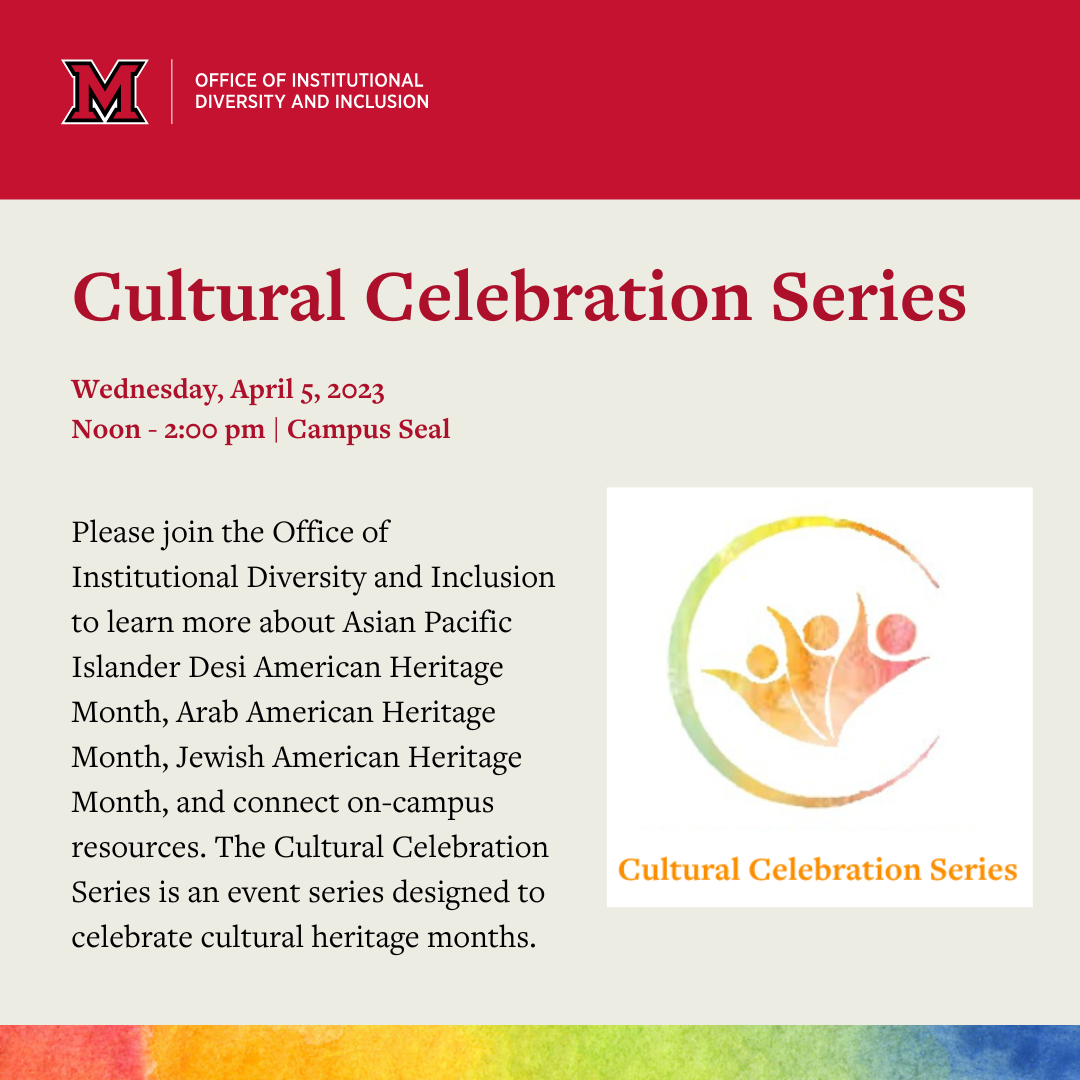
Miami University’s opening event for the April Heritage Month events. Please join the Office of Institutional Diversity and Inclusion to learn more about Asian Pacific Islander Desi American Heritage Month, Arab American Heritage Month, Jewish American Heritage Month, and connect on-campus resources. The Cultural Celebration Series is an event series designed to celebrate cultural heritage months.
Stress Less Week
The Student Counseling Service and the Suicide Prevention Team are proud to sponsor Stress Less Week. Our goal is to help students increase awareness of ways to manage stress and anxiety and improve the emotional health of our campus community. Stress Less Week will be held from April 6-13, 2023, and includes the activities listed on the Stress Less Week website.
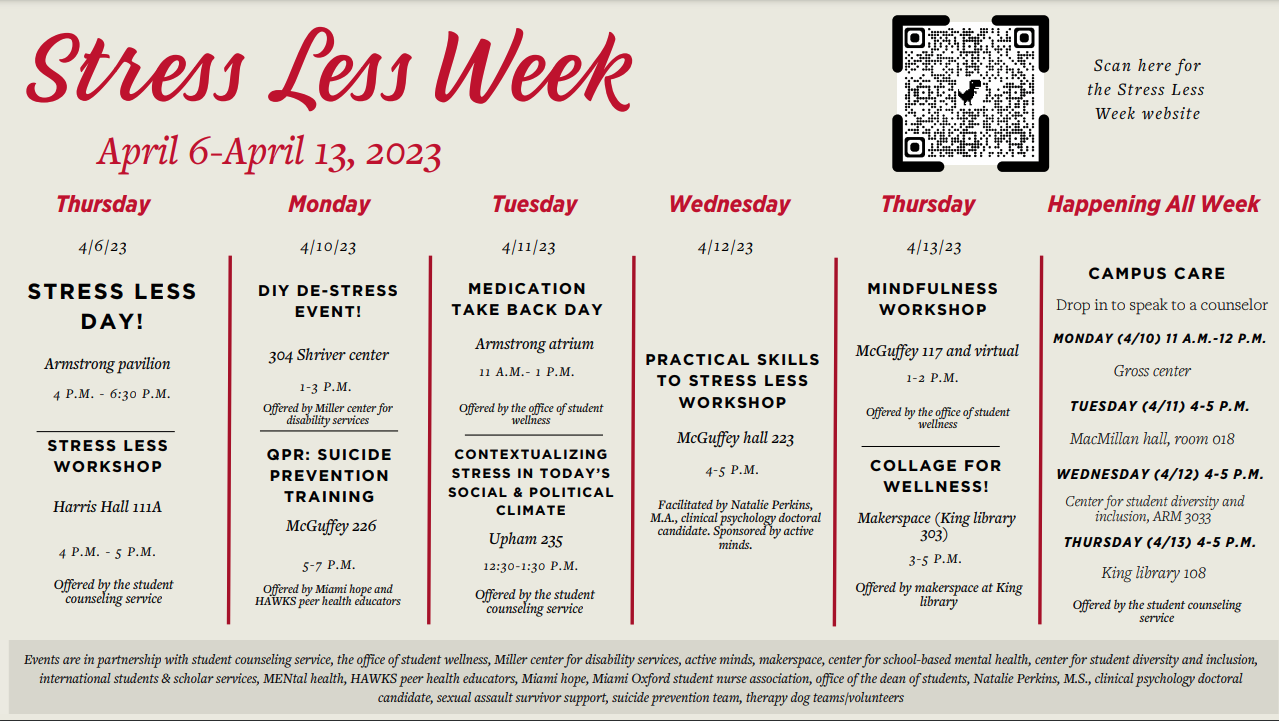
University Diversity and Inclusion Awards
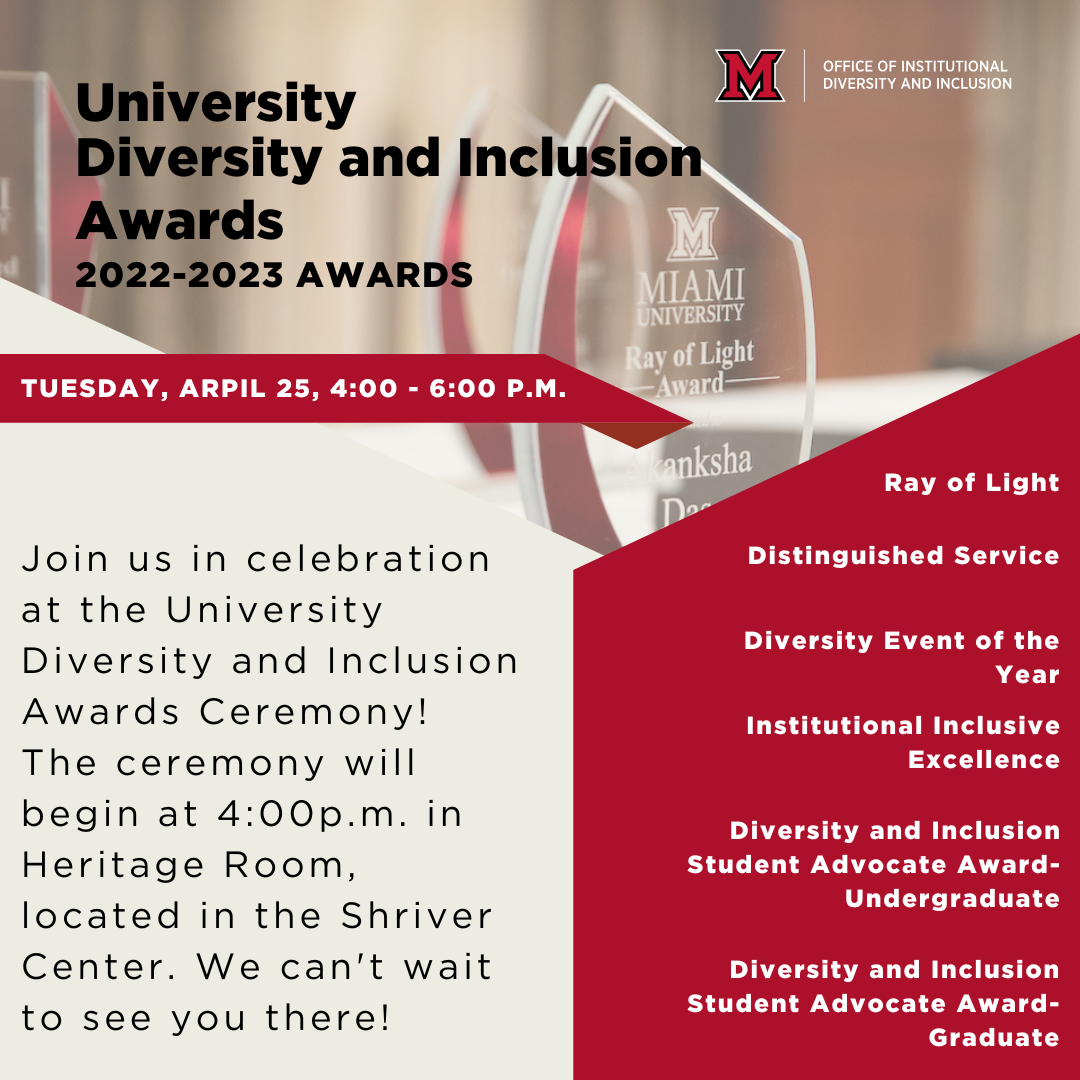
Tuesday, April 25 │4 - 6 p.m.
Join us in celebration at the University Diversity and Inclusion Awards Ceremony! The ceremony will begin at 4:00 p.m. in the Heritage Room, located in the Shriver Center. We can't wait to see you there!
Spring 2023 Book Discussion
Global Initiatives (GLI) and the Office of Institutional Diversity and Inclusion (OIDI) invite Miami staff to participate in a Spring 2023 book discussion focused on the 2020 NAFSA publication, Social Justice and International Education: Research, Practice, and Perspectives edited by Dr. LaNitra Berger. Dr. Berger is NAFSA President and Chair of the Board of Directors and Associate Professor of Art History and Director of African and African American Studies at George Mason University.
Discussion groups will take place at noon in the International Student Center (MacMillian Hall 017) on the following dates:
- April 7, 2023 (Chapters 7, 8, & 9)
- April 28, 2023 (Chapters 10 & 11)
You are welcome to bring your lunch with you. We ask that those who SIGN UP and receive a copy of the book (20 copies available) please commit to participating in at least three of the five discussion sessions. If you have any questions about this program please feel free to reach out to Karla Guinigundo, Director of Global Partnerships, at guinigkm@miamioh.edu.
A Reading by Grace Talusan
Wednesday, April 12 │6 p.m. │Middletown Campus, Johnston Hall 142
Enjoy a reading by award-winning author Grace Talusan from her critically acclaimed memoir, “The Body Papers,” a “New York Times” Editors’ Choice selection. The book explores the fraught contours of her life as a Filipino immigrant and survivor of cancer and childhood abuse.
Free event | No RSVP required
MiamiOH.edu/Regionals/LLW
Questions? Email Marianne Cotugno at mcotugno@MiamiOH.edu.
Sponsored by: The Office of Institutional Diversity and Inclusion, Center for Diversity, Equity, and Inclusion, Languages, Literature, and Writing, and Public Programming.
Survivor Support Series
The Office of Student Wellness is hosting a survivor support series for survivors of sexual violence and other forms of interpersonal violence (Domestic violence, stalking, sexual harassment, dating violence, etc.) This series is not therapy and should not replace therapy, but it was created to aid in the healing journey of survivors. Session leaders are all trained or licensed to provide support to survivors. This is open to all survivors regardless of gender identity or sexual orientation.
Students are welcome to come to any or all of the following sessions below, please indicate which sessions you would like to attend*:
April 4th - "Trauma-Sensitive Yoga."
For coffee & conversations, we will be joined by Oxford Community Yoga for a session of trauma-sensitive yoga. This session has the goal of helping survivors start the process of feeling at home in their bodies again after an assault.
April 18th - "Navigating intimacy after an assault."
We will be joined by a licensed counselor Carly Deremo who will talk to students about how sexual assault can change how we think about intimacy and sex and how to think about those topics moving forward.
If you have any questions, please do not hesitate to Contact Morgan Moore at: moorem23@miamioh.edu
*Indicating you want to come now does not mean you cannot change your mind later.
Students can find more information or can sign up here: https://events.miamioh.edu/event/coffee_conversations_survivor_support_series_introduction
2023 Welling Lecture
Tuesday, April 11│7 p.m. │ Shideler Hall, 152
Dr. Ben-Moshe will discuss the genealogy of deinstitutionalization by contesting the hegemonic narrative that prisons are the new asylums, and the social scientific expert knowledge that make it seem so commonsense. By so doing, she will paint a more complex picture of the relation between disability/madness and mass incarceration.
Throughout this talk Ben-Moshe will interrogate and destabilize the seemingly neat connections being drawn between deinstitutionalization, homelessness, and imprisonment by discussing the medicalization of housing insecurity and the new social science research trying to prove the connection between deinstitutionalization and housing insecurity by uncritically constructing and reifying the category of the “homeless mentally ill.” She will then discuss the criminalization of housing insecurity to provide a counter explanation to the nexus of homelessness and imprisonment.
To answer the question of the prevalence of incarcerated people with mental health difference, she will also examine the disabling effects of imprisonment as well as the lack of mental health treatment while incarcerated.
This program is sponsored by Miami University's Miller Center for Student Disability Services, Disability Studies program, and the Humanities Center. For more information, please visit the event’s Localist page in the University Events calendar.
Better Together
Miami supports Better Together Days, an annual event organized on colleges and universities across the U.S., headed by the national nonprofit organization Interfaith Youth Core. Students come together to learn about faith and meaning-making traditions other than their own, to identify common values, and to collaborate on community service projects.
Better Together Week will take place starting Monday, April 16th to Sunday, April 22nd. Miami supports Better Together Week, when students come together to learn about faith and meaning-making traditions other than their own, to identify common values, and to collaborate on community service and engagement projects. Sponsored by META, our focus is on broadening the understanding of diversity and inclusion on campus through events, relationship building, and education. We invite all student leaders to be a part of our community, coming just as they are. To learn more about Better Together and to RSVP for any of the events listed below, please visit this form.
List of events:
- Farm, Fries, and Faith Service Project (4/16 - AM @ Martin Dining Hall (meeting location))
- Addressing Islamophobia: Dispelling Myths to Break down Barriers with Dr. Amer Ahmed (4/16 - 5pm @ The Interfaith Center)
- The Role of Religious Diversity in Global Leadership Workshop with Dr. Amer Ahmed (4/17- 10am - 12pm @ ASC Pavilion C)
- Community Iftar (Dinner) with MSAs & MESA (4/17 - 8pm @ The Interfaith Center)
- “Stranger at the Gate”: Living Room Conversation and Coffee Hour with Dr. Amber Franklin (4/18 - 3pm @ TBD / SHD 052)
- Sacred Activism, Service, and Sustainable Development Panel with EWB, SSC, & ASG (4/18 - 6:30pm @ TBD)
- Better Together Week Key Note Address: Leadership & Ukraine (4/19 - 6pm - 8pm @ Wilks Theatre in ASC)
- The Geopolitics of Religious Soft Power with RedHawks Count (4/20 - 7pm @ ASC 1082)
- The Vote is Sacred (4/21 - TBD @ The Interfaith Center)
- EarthFest 4 Earth Day (4/22 - 11am - 2pm @ Uptown Memorial Park)
Horison Graduation
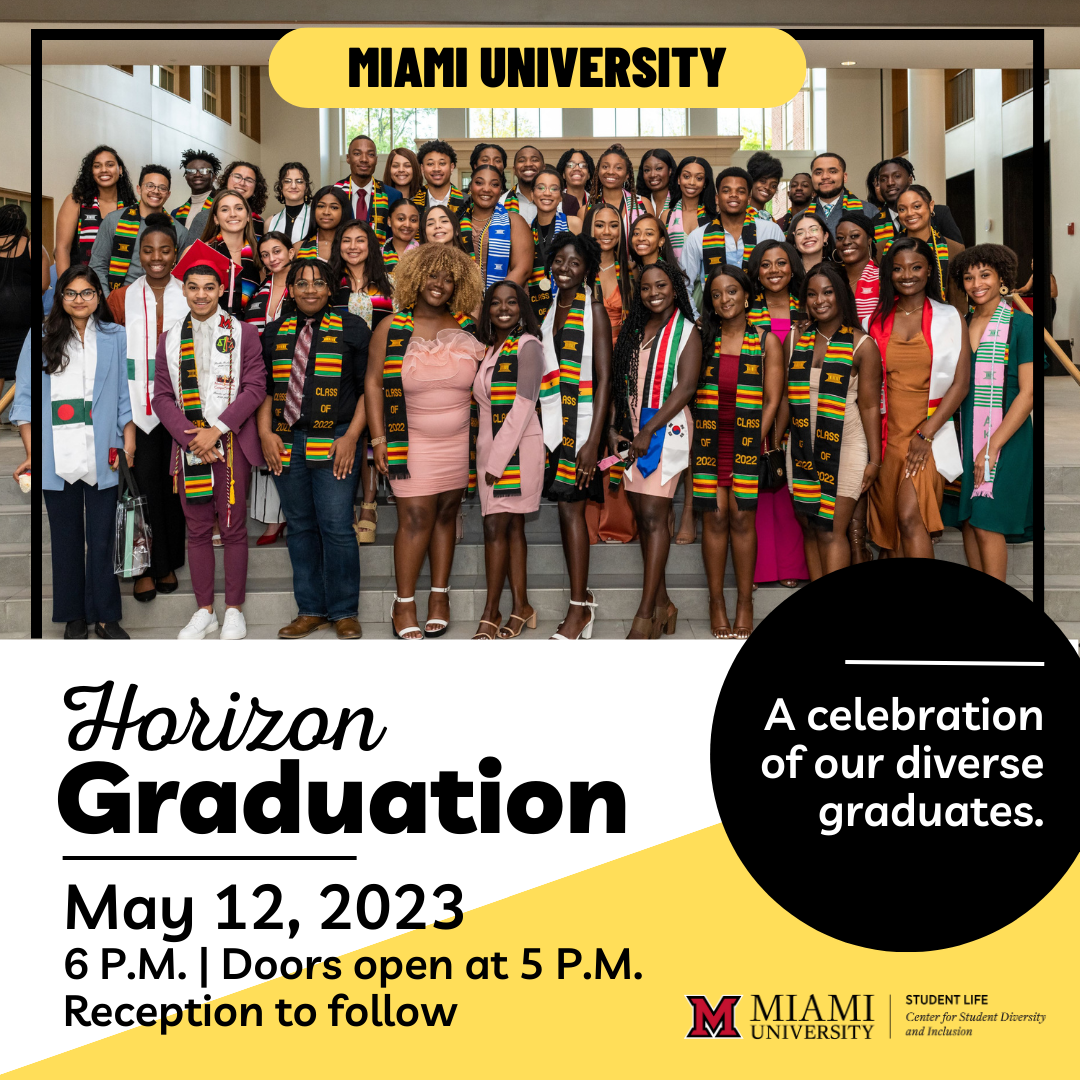
Friday, May 12th │6 p.m.
The Horizon Graduation ceremony recognizes and celebrates the accomplishments of graduating undergraduate and graduate diverse students. The name Horizon was chosen to signify the new beginnings, opportunities, challenges, outlooks, and options facing our students at the dawn of their professional lives.
Horizon looks a little different than the traditional commencement. The graduates are instructed to wear what best suits them during the ceremony. Registration is open and students are encouraged to complete the Horizon 2023 Registration, the deadline is April 14th.
Sponsored by: Center for Student Diversity and Inclusion
Lavendar Graduation
Saturday, May 6th │2 - 4 p.m.
Lavender Graduation is an annual ceremony to honor lesbian, gay, bisexual, pansexual, transgender, nonbinary, queer, and ace students and to acknowledge their achievements and contributions to the University. Students graduating in the Spring, Fall, or Winter of 2023 are welcome to participate.
All guests and graduates must RSVP.
Student Registration Deadline: Friday, April 7th
Guest Registration Deadline: Wednesday, April 26th
Sponsored by: Center for Student Diversity and Inclusion
Noche de Gala

Saturday, April 15, 8:00 p.m. - 11:00 p.m.
Noche de Gala is UNIDOS's annual gala to celebrate and celebrate with Miami's Latinx/Hispanic students and community allies--this year's theme is "Night at the Met". All are welcome to dress up, dance, mingle, and eat on Saturday, April 15 from 8:00 - 11:00 pm in the Armstrong Pavillion! Admission is free, just RSVP through our Eventbrite link to secure your spot!
Newsletter Submissions
For more information and updates, please add the DEI events Calendar to your Google calendar. To have your event added to the calendar, please complete the newsletter submission form.
Capacity-Building and Leadership Development
Reimagining the Academy: Building Communities for Access and Transformational Change
Kent State University, Miami University and Ohio University have joined forces to form a collaborative conference: Reimagining the Academy: Building Communities for Access and Transformational Change. Previously, each university held an annual conference on topics related to diversity, equity and inclusion. This new alliance will allow the universities to come together for one conference that will share expertise and leverage their strengths.
Reimagining the Academy will take place October 18-19, 2023 in the Kent Student Center. Virtual engagement opportunities will also be available.
Registration will be free to faculty, staff and students at each of the collaborating institutions.
We encourage conference participation from all Kent State students, staff and faculty, and welcome submissions to our Call for Proposals. We are seeking submissions for workshops, oral sessions, roundtables, and panel discussions focusing on anti-racism, diversity leadership and building community. The priority deadline is April 21, 2023.
Keynote speaker, Carol Anderson, Ph.D., will speak on October 19th. Dr. Anderson is a professor of African American Studies at Emory University and is the author of several bestselling books including The Second: Race and Guns in a Fatally Unequal America (2020), One Person, No Vote: How Voter Suppression Is Destroying Our Democracy (2018) and the critically-acclaimed #1 bestseller White Rage (2016).
Those interested in joining the conference listserv to receive up-to-date information regarding announcements, registration, important dates and more should visit www.kent.edu/reimagining.
Additional questions can be sent to arconference@kent.edu
We look forward to having you join us for this very enriching conference. Thank you!
Sincerely,
Amoaba Gooden, Ph.D.
Vice President for Diversity, Equity and Inclusion
Professor of Africana Studies
Kent State University
Cristina Alcalde, Ph.D.
Vice President for Institutional Diversity and Inclusion
Miami UniversitySalome Nnoromele, Ph.D.
Interim Vice President of Diversity and Inclusion
Ohio University
Redhawks Equity Leadership Series
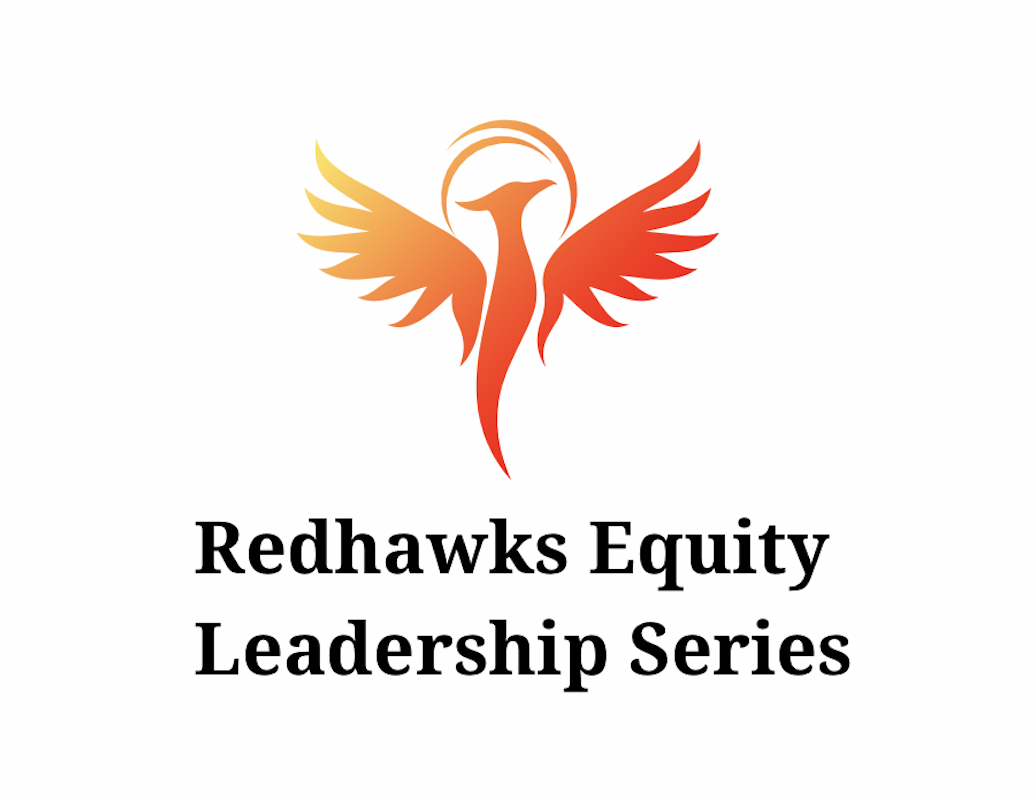
Join our online Diversity, Equity, and Inclusion course for undergraduate and graduate students. Launching on April 15th, we invite all students to sign up to be a part of the first cohort of students to complete the training. The Redhawks Equity Leadership Series encompasses a set of five workshops: (1) Allyship, (2) Anti-Racism, (3) Diversity Statement Workshop, (4) DEI in Resumes/CVs Workshop, (5) Pronouns 101. Enroll today by signing up by completing the Registration Form.
We hope to keep updating this series with additional workshops, resources, and upcoming events to support students' growth as inclusive leaders.
April Anti-Racism Workshop
Friday, April 10th │10 - 11:30 a.m. │Shriver Center, Bystrom Room
Anti-racism work requires sustained, proactive education and engagement as well as systemic, intentional efforts at micro- and macro-levels. We will learn about our responsibilities in racial equity and how to prevent racism. We will discuss how to identify racist behaviors both in ourselves and in others and how to counter and dismantle such behaviors. The workshop will also provide tools and strategies for having conversations around racism and how to prevent, stop, and unlearn racial prejudices. This workshop can be tailored for individual departments or student organizations. Request workshop for your department/unit or student group.
To sign up for our next workshop, please visit our website.
Diversity Statement Workshop
Thursday, Apr. 20, 3:30 - 4:30 p.m., Zoom (University Event)
Join the Office of Institutional Diversity and Inclusion to learn about Diversity Statements and how to write one of your own for either graduate school or a job application. Participants will be exposed to the best practices for crafting a response that incorporates their lived experiences. This workshop will also offer time for participants to draft an outline through a handout. We also invite participants to bring drafts of statements, if they have one, to get feedback and input from the facilitator. This session is intentionally built to be flexible to meet the needs of the group.
Registration: https://miamioh.zoom.us/meeting/register/tZwucOCtqjosHNBWLX_JgugnA-cnjcsqJnPD
Religious Observances and Inclusive Scheduling
As we enter the last two months of the Spring semester, the Office of Institutional Diversity and Inclusion (OIDI) encourages all Miami community members to consult the full list of Religious Observances and Inclusive Scheduling dates on our website. Below we highlight a few key religious holidays and observances, including a description of the holiday, best practices, and customary greetings to support our active investment in fostering an inclusive campus community. Please note that these are not all of the holidays that are taking place in the spring semester, nor is this a fully inclusive list.
March 22-April 21* - Ramadan (Islam)
- Description: Ramadan is considered one of the holiest months of the year for Muslims. It is widely considered the month in which the Qur’an was first revealed. Fasting in the month of Ramadan is one of the “five pillars” of Islam. Practicing Muslims who are able to do so are expected to fast from sunrise to sunset every day of the month. This means no food, and no water during that time. At the end of Ramadan, Muslims celebrate one of their major holidays called Eid al-Fitr (April 21-22*) or the “Festival of the Breaking of the Fast.”
- Best Practices: Please consider the practice of fasting and focus of the month when scheduling any events, “lunch meetings,” or scheduling lengthy presentations. Not all Muslims will fast or take time off, but they may still observe in various ways.
- Customary Greetings: "Ramadan Mubarak" (MOO-bah-ROK) or "Happy Ramadan"
April 5-13 - Passover (Judaism)
- Description: Passover celebrates the Biblical story of Exodus, when the Israelites were freed from their slavery in Egypt. Passover is "prescribed" in the Book of Exodus in the Old Testament. Passover is celebrated with a big ceremony. On the first night, a special family meal called seder is held. The seder foods symbolize the Jewish liberation. People also recite traditional prayers. During Passover, Jews eat unleavened bread for seven days. On the first and last night of Passover, people may want to take off work. They are considered sacred occasions when one is not to work at their occupations. Festive meals take place during the holiday.
- Best Practices: Please consider the celebrations of Passover when scheduling any events or scheduling lengthy presentations. Not all practicing Jews will take time off, but they may still observe in various ways.
- Customary Greetings: “Happy Passover” or “Chag Sameach” (Chahg Sa-MAY-Ach)
April 7 - Good Friday (Christian)
- Description: Good Friday commemorates the day that Jesus was crucified and died. It is considered a day of mourning, and is a part of holy week. Even though it is a sad day, it is called Good Friday because it led to the victory over death and sin. Many services are held around midday which is the same hours that Jesus was hung on the cross. Good Friday is an obligatory day of fasting and abstinence for Catholics.
- Best Practices: Please consider the practice of fasting when scheduling any events, “lunch meetings,” or scheduling lengthy presentations. Not all Christians will fast or take time off, but they may still observe in various ways.
- Customary Greetings: There is no traditional greeting for this day, as it is a somber holiday typically associated with reflection and mourning.
April 9 - Easter (Christian)
- Description: Easter celebrates the belief in the resurrection of Jesus Christ. Three days after his crucifixion, he resurrected. For many Christians, Easter is positive because it is the end of the Lent season of fasting and penitence. Christians worldwide attend an Easter mass with special services, music, flowers, and ringing of church bells. The Easter Eggs symbolize rebirth and fertility. In countries around the world, people hold Easter egg hunts, egg decorating events, or just giving them as gifts. Traditional Catholics sometimes continue the Good Friday fast until the Easter Vigil.
- Best Practices: Please consider the practice of fasting when scheduling any events, “lunch meetings,” or scheduling lengthy presentations. Not all Christians will fast or take time off, but they may still observe in various ways.
- Customary Greetings: “Happy Easter” or “Christ is Risen” with the reply “He is Risen Indeed”
Note: “*” denotes holidays that start sundown the day before. Please note that individual practices may vary.
We also encourage the use of our Religious Observances and Inclusive Scheduling calendar to provide guidance and help avoid scheduling important events, activities, and deadlines on holidays observed by members of the Miami community. Should you or a member of your team have any questions or concerns on how to best utilize this information or on appropriate accommodations, please contact the Office of Institutional Diversity and Inclusion or the Office of Equity and Equal Opportunity.
Call for Submissions
If you have any Miami updates or relevant information that you would like to have included in the next edition, please complete the newsletter submission form.


